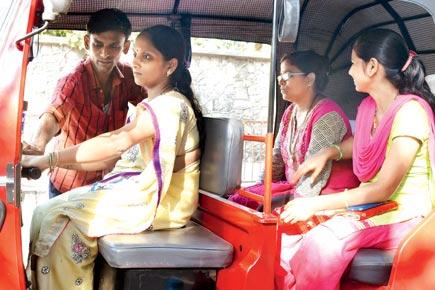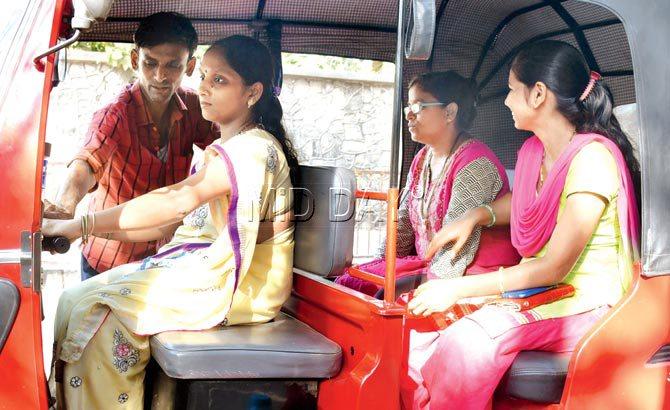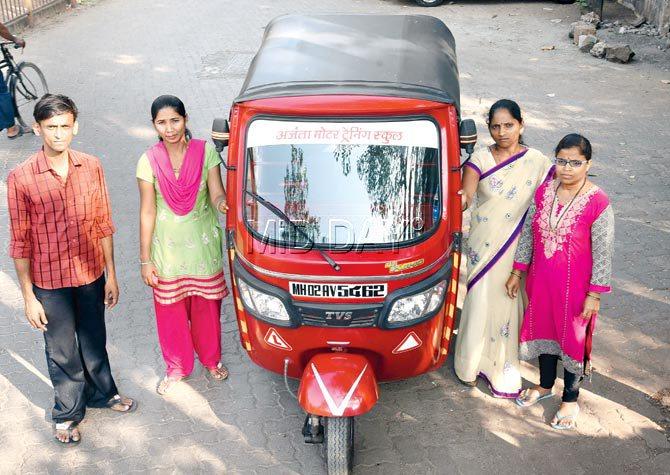We meet three of the 40 women who are training to become Mumbai's first female autorickshaw drivers. They are doing more than just learning another means of livelihood


The first lot of women autorickshaw drivers being trained across Mumbai. Pics/Nimesh Dave
ADVERTISEMENT
Swati Dhamankar (32) is a woman of few words. But, her skill behind the wheel of an autorickshaw more than makes up for her timidity. She sizes up the nearly empty road in Chunabhatti, revs up the engine, and off she goes. Dhamankar is one of the 40 women taking autorickshaw driving lessons in the city, thanks to reservation of permits.
When mid-day catches up with Dhamankar on a hot Friday on a Chunabhatti road, she is accompanied by her trainer, Milind Jain — seated right next to her — and two other aspirants, Manisha More and Atharva Pashte, who take turns in running the vehicle.
The three women are doing more than just learning another means of livelihood; they are smashing the glass ceiling in an otherwise male-dominated business.
Thanks to govt
The women owe their newfound inroads into the autorickshaw driving sector to the state government's initiative of reserving 5 per cent of permits — 465 of them — for women. Sources in the Regional Transport Office (RTO) say initially, 400 women from eastern and western suburbs of Mumbai came forward and even won permits. "Later, when they learnt that women permit holders will have to is mandatorily drive autorickshaws, the numbers dropped drastically," says a RTO official.

(From left) Trainer Milind Jain, Manisha More, Swati Dhamankar and Atharva Pashte get ready for their lesson on a Chunabhatti road
The sources said most of these women had assumed that they would be able to transfer their permits to male members of their families. Currently, 40 women have begun driving lessons; 150 others have applied for learners' licences.
Making inroads
Dhamankar says her training began 30 days ago. "We drive every alternate day. We started off with just 10-15 minutes of training. Now, we train for upto an hour," says the resident of Suman Nagar in Chembur, who has already decided on her route — Sumar Nagar-Chembur. "The roads there are familiar to me," says the homemaker, whose family comprises an autorickshaw driving husband and a child.
Right after her, Kurla resident More (30) jumps into the driver's seat. She says she sees driving autorickshaws as a challenge — she shudders at the thought of taking on Kurla's notorious traffic bottlenecks and poor roads — but is "ready to tackle it". "I don't want to drive beyond 6 pm. My day starts early since I have two schoolgoing kids," says More, who has been practising for the last 20 days.
Right after Pashte (37), a resident of Chunabhatti, finishes her turn, she reveals that she has already had encounters with sexism. "Some male autorickshaw drivers have joked that soon, men will wash utensils and women will drive autorickshaws. She says she has two children and her husband is currently unemployed but "fully supports" her in her quest to become a driver. She, too, says she will stick to her locality.
The women expect to earn at least R5,000-7,000 per month, and hope that Mumbaikars will not resort to discriminatory practices. Over to you now, Mumbai. Will you give these women a chance?
 Subscribe today by clicking the link and stay updated with the latest news!" Click here!
Subscribe today by clicking the link and stay updated with the latest news!" Click here!






